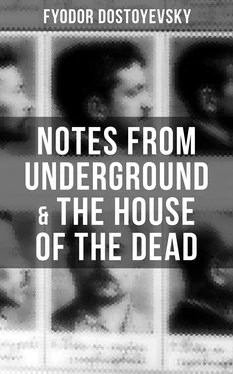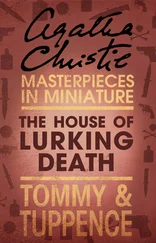1 ...8 9 10 12 13 14 ...25 I cannot resist the desire to say a few words about this man, although it will interrupt my narrative. He was about sixty years old, thin, and growing very grey. He excited my curiosity the first time I saw him, for he was not like any of the others; his look was so tranquil and mild, and I always saw with pleasure his clear and limpid eyes, surrounded by a number of little wrinkles. I often talked with him, and rarely have I met with so kind, so benevolent a being. He had been condemned to hard labour for a serious crime. A certain number of the Old Believers at Starodoub had been converted to the orthodox religion. The Government had done everything to encourage them, and, at the same time, to convert the remaining dissenters. This old man and some other fanatics had resolved to ‘defend the faith.’ When the Orthodox church was being constructed in their town they set fire to the building, and this offence had brought upon its author the sentence of deportation. This well-to-do shopkeeper-he was in trade-had left a wife and family whom he loved, and had gone off courageously into exile, believing in his ignorance that he was ‘suffering for the faith.’
When one had lived some time by the side of this kind old man, one could not help asking the question, How could he have rebelled? I spoke to him several times about his faith. He gave up none of his convictions, but in his answers I never noticed the slightest hatred; and yet he had destroyed a church, and was far from denying it. In his view, the offence he had committed and his martyrdom were things to be proud of.
There were other Old Believers among the convicts-Siberians for the most partmen of well-developed intelligence, and as cunning as all peasants. Dialecticians in their way, they followed blindly their law, and delighted in discussing it. But they had great faults: they were haughty, proud, and very intolerant. The old man in no way resembled them. With far more belief in religious exposition than others of the same faith, he avoided all controversy. As he was of a gay and expansive disposition he often laughed-not with the coarse cynical laugh of the other convicts, but with a clarity and simplicity in which there was something of the child, and which harmonized perfectly with his grey head. I may perhaps be wrong, but it seems to me that a man’s character may be recognized by his mere laugh. If you know a man whose laugh inspires you with sympathy, be assured he is an honest man.
The old fellow had won the respect of all the prisoner! without exception; but he was not proud of it. They called him grandad, and he took no offence. I thus understood what an influence he must have exercised on his co-religionists.
In spite of the fortitude with which he endured prison life, one felt that he was tormented by a profound, incurable melancholy. I slept in the same barrack with him. One night, towards three o’clock in the morning, I woke up and heard a slow, stifled sob. The old man was sitting on the stove-the same place where the convict who had wished to kill the governor used to pray-and was reading from his manuscript prayer-book. As he wept I heard him repeating ‘Lord, do not forsake me. Master, strengthen me. My poor little children, my dear little children, we shall never see one another again.’ I cannot say how much this moved me.
We used, then, to entrust our money to this old man. Heaven knows how the idea got abroad in our barrack that he could not be robbed. It was well known that he hid the savings deposited with him, but no one had been able to discover where. He revealed it to us-to the Poles and myself. One of the stakes in the palisade bore a branch which appeared to belong to it, but which could be removed and put back again. When it was removed a hole could be seen, and this was his hiding-place.
But to return to my story. Why is it that a convict never saves his money? Well, not only is it difficult for him to keep it, but prison life is so miserable that a man, of his very nature, thirsts for freedom of action. His position in society makes him so irregular a being that the idea of swallowing up his capital in orgies, of intoxicating himself with revelry seems to him quite natural if only he can procure himself one moment’s forgetfulness. It was strange to see certain individuals bent over their labour with the sole object of spending their earnings in a single day, even to the last kopeck. Then they would set to work again until they could afford another debauch, which was looked forward to months beforehand.
Some convicts were fond of new clothes, more or less singular in style, such as fancy trousers and waistcoats; but it was above all for coloured shirts that they had a pronounced taste; also for belts with metal clasps.
On holidays the prison dandies wore their Sunday best. They were worth seeing as they strutted about their part of the barracks. Their pleasure in feeling themselves well dressed amounted to childishness; indeed, in many things convicts are only children. Their fine clothes, however, disappeared very soon, often in the evening of the very day on which they had been bought. Their owners pledged them or sold them again for a trifle.
Merrymaking generally took place at fixed times. It coincided with religious festivals, or with the nameday of some bibulous convict. On getting up in the morning he would place a wax taper before the ikon; then he said his prayers, dressed, and ordered his dinner. He had previously bought meat, fish, and little patties, which he gorged like an ox and almost always alone. It was very rare to see one convict invite another to share his repast. At dinner vodka was produced. The convict would suck it up like the sole of a boot, and then walk through the barracks swaggering and tottering. He was anxious to show his companions that although he was drunk* he was carrying on, and thus obtain their particular esteem.
The Russians always feel a measure of sympathy for a drunken man; among us it amounted really to esteem. In prison intoxication was regarded as a sort of aristocratic distinction.
As soon as he felt himself in high spirits the convict sent for a musician. We had among us a little fellow-a deserter from the army-very ugly, but who was the happy possessor of a violin on which he could play. As he had no trade he was always ready to follow the festive convia from barrack to barrack grinding out dance tunes for him with all his strength. His countenance often expressed the fatigue and disgust which his music-always the same-caused hum; but when his employer shouted at him, ‘Go on playing, aren’t you paid for it?’ he attacked his violin more strenuously than ever. These drunkards felt sure that they would be taken care of, and in case of the governor arriving would be concealed from his watchful eye. This service we rendered in the most disinterested spirit. On their side the under-office and the old soldiers who remained in the prison to keep order, were perfectly reassured. The drunkard would cause no disturbance. At the least scare of revolt or riot he would have been silenced and tied up. Accordingly the subordinate officials closed their eyes; they knew that if vodka was forbidden all would go wrong. How was this vodka procured?
It was bought in the prison itself from drink-sellers, as they were called, who followed this trade-a very lucrative one, although the tipplers were not very numerous, for revelry was expensive, especially when it is considered how hardly money was earned. The drink business began, continued, and ended in rather an original manner. A prisoner who knew no trade, who would not work, but who, nevertheless, desired to get rich quickly, made up his mind, when he possessed a little money, to buy and sell vodka. The enterprise was risky and required great daring, for the speculator hazarded his skin as well as his liquor. But the drink-seller hesitated before no obstacles. At the outset he brought the vodka himself to the prison and got rid of it on the most advantageous terms. He repeated this operation a second and a third time. If he had not been discovered by the officials, he now possessed a sum which enabled him to extend his business. He became a capitalist with agents and assistants; he risked much less and gained much more. Then his assistants incurred the risk instead of him.
Читать дальше












